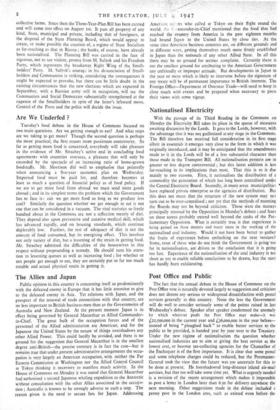Are We Underfed ?
Tuesday's food debate in the House of Commons focused on two main questions. Are we getting enough to eat? And what steps are we taking to get more? Though the second question is perhaps the more practical, the first rouses more passionate controversy. So far as getting more food is concerned, everybody will take pleasure in the evidence of Mr. Strachey's active zeal in concluding food agreements with countries overseas, a • pleasure that will only be exceeded by the spectacle of an increasing ratio of home-grown foodstuffs. Mr. Morrison did well to emphasise that pointedly when announcing a five-year economic plan on Wednesday. Imported food must be paid for, and therefore becomes at least as much a question of financial policy as of food policy. If we are to get more food from abroad we must send more goods abroad ; and in its simplest terms the problem which the Government has to face is : can we get more food so long as we produce less coal? Similarly the question whether we get enough to eat is not one that can be considered in a vacuum. The vital statistics so freely bandied about in the Commons are not a reflection merely of diet. They depend also upon preventive and curative medical skill, which has advanced rapidly, and on housing standards, which 'continue deplorably low. Further, the test of adequacy of diet is not the amount of food consumed, but its energising effect. This involves not only variety of diet, but a lessening of the strain in getting food. tMr. Strachey admitted the difficulties of the housewives in this respect without propounding a remedy. He should turn his atten- tion to lessening queues as well as increasing food ; for whether or not people get enough to eat, they are certainly put to far too much trouble and actual physical strain in getting it.






































 Previous page
Previous page